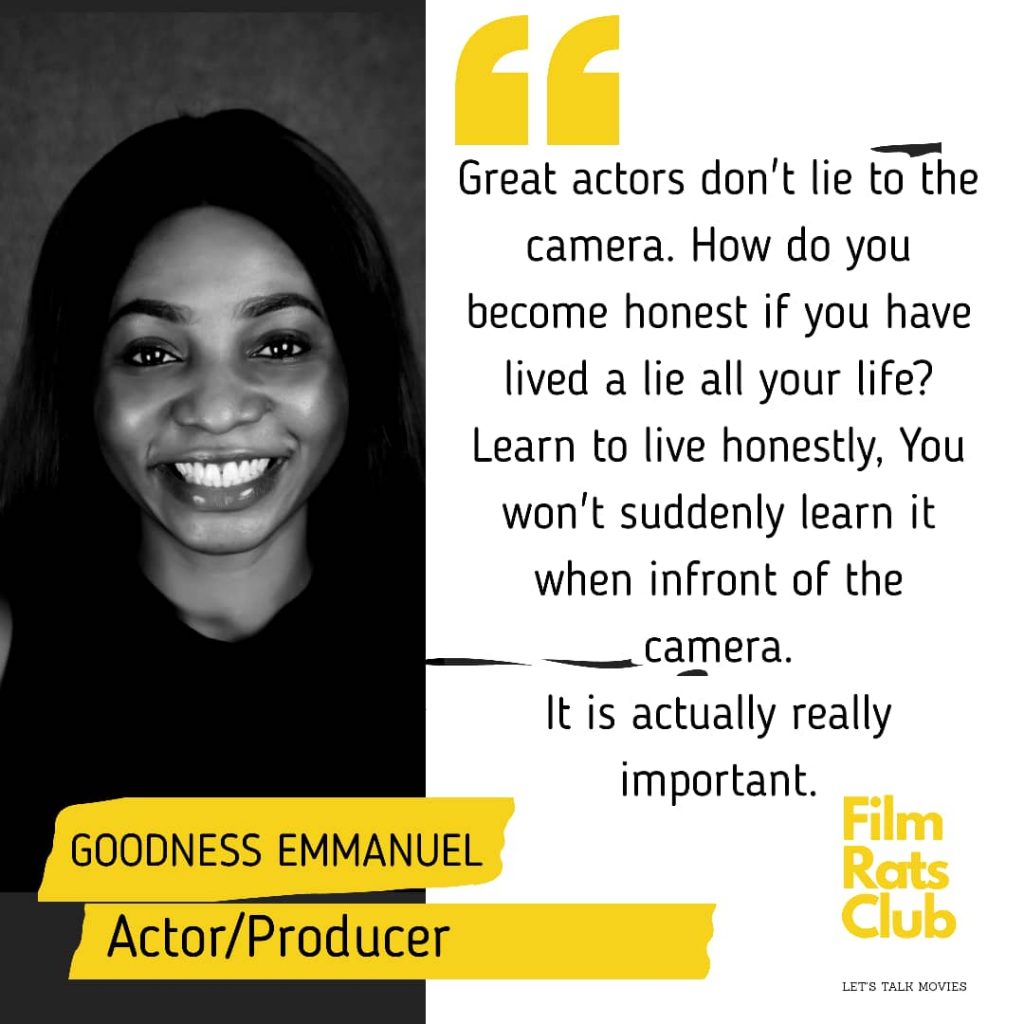Dialogue with Goodness Emmanuel: Why you may not get that big break as an actor
Goodness Emmanuel has featured in several theatre, TV and film productions: Kongi’s Harvest (in commemoration of Wole Soyinka at 75), Tribute to Broadway (Lagos Theatre Festival, 2016), Still Single in Gidi (Lagos Theatre Festival 2017 & 2018), Mammy Water’s Wedding (Black Heritage Festival 2014), , Eyimofe, (AMAA awards serial nominee), Crossroads (Jungle Films), Rumour has it, Pushing 30 (Africa Magic) The Griot (Which she produced), Forbidden (MNET Africa), Ajoche (MNET Africa), Soul Sistas (Royal Roots production). She is currently amongst the cast for Nigeria’s first Netflix original production. Also a proficient singer and producer, Goodness can be said to be the total artist. The Griot, her film production debut, had a trailer that caused quite the stir and is set for a release very soon. Some weeks ago, Film rats club hosted Goodness Emmanuel to discuss her craft and more. Fellow actor, screenwriter and rat,Temi Fosudo, sparred with her in what became roughly two hours of matured and insightful dialoguing. The transcript below has been edited for publication. Q: Miss Goodness Emmanuel, what attracted you to the profession of acting? Goodness Emmanuel: Sheer fascination, to be honest. Growing up, I watched people become something different on screen and stage and I was always in complete awe. I was interested in knowing how they did it. So the first time I had the opportunity to audition, I jumped at it. Q: When and where was this? Goodness Emmanuel: In 2007, I was with my friend at the Theatre Arts department in UI and she said to me, “Goodness you know how to sing, you should audition for The Sound of Music”. So I wrote my name down and just walked into the hall. I remember being so scared because they kept screaming at me and asking me to project my voice, but I guess I went on to do something right because I got a call back. Prior to that time, I was already taking some courses in Theatre Arts, even though I was a law student. Q: Oh nice. So, you started your journey from the university. Is this where you received your professional training as a thespian and do you still train today or have learnt enough? Goodness Emmanuel : Yes, this was where I got my first professional training. You can never learn enough. I still attend Masterclasses and take online courses whenever I can. I enjoy learning and getting better, so I jump at any opportunity to get better. Q: So clearly you started out as a stage actor and then branched into acting for screen. Do you prefer one medium over the other or you just adapt to their peculiarities? Goodness Emmanuel: I have a soft spot for stage acting, mainly because of the increased theatrical freedom and being my much freedom and being my first no love. However, screen also has its peculiarities and I’ve learnt to embrace them. I’m an actor and I love performing on whatever medium. I take work wherever I see it. Camera, stage, radio, anywhere. Q: Do you use any technique or have any philosophy that guides your acting? Whether popular of self designed? Goodness Emmanuel: I’d answer this question with one word: “Honesty” Q: But do you know of popular teachers of acting and their techniques? Have you bothered to examine their research into acting? Goodness Emmanuel: Of course. There are so many popular teachers of acting: Stella Adler, Lee Strasberg, Stanislavsky, Meisner, etc. And as any good student should, I have studied all of them. Ofcourse I have reservations about some of them, but that’s why I am actor, I question things. Q: Unlike a writer who can keep working without being hired, an actor is bound to wait for that call. What should actors do before the call comes? Goodness Emmanuel: First of all, let me say you are not exactly bound to wait for that call. I understand that in the traditional sense, we may feel like we are bound to wait, but we really aren’t. Q: Okay, so what do you do? How do you ensure you are not just waiting for that call? Goodness Emmanuel: One, I always say that the waiting period is an opportunity to discover who you are. Two, it is a period to hone your skills. If you haven’t improved between your last job and the new one, then what’s the point? Thirdly, find your tribe. ‘Your tribe’ is a group of people who share the same drive and passion bubbling within you. A community of people you can rely on. Number four, be honest. Five, be intentional. And finally, expose yourself shamelessly in ways that are bound to garner all sort of responses. This is how you learn how to deal with the wide spectrum of responses when they come as you progress in your career. Q: I see a lot of our actors use the phrase ‘working actor’. In essence, they are suggesting a delineation from other actors who, I guess, are ‘unworking actors’. How does an ‘unworking’, but prepared actor cope with the work drought and the feeling of uselessness? Does he stop calling himself an actor? I learnt that a great like Morgan Freeman didn’t get his major break till he was a bit old, that is why he has been old since we all knew him (I saw him in a very old Malcolm X movie though, playing Malcolm, funny sight it was) I’m sure he must have been an ‘unworking actor’ for very long. Does this phrase, ‘working actor’ make any sense to you? Goodness Emmanuel: Waiting is an art form. As actors we are always waiting. Waiting for that job, for the next scene, for your fellow actor, for many things. And we have to embrace it as part of the process. Many of these “working actors” aren’t honestly working all the time. They just want you to believe they are. As an actor, while you’re not “working”, you can still be

